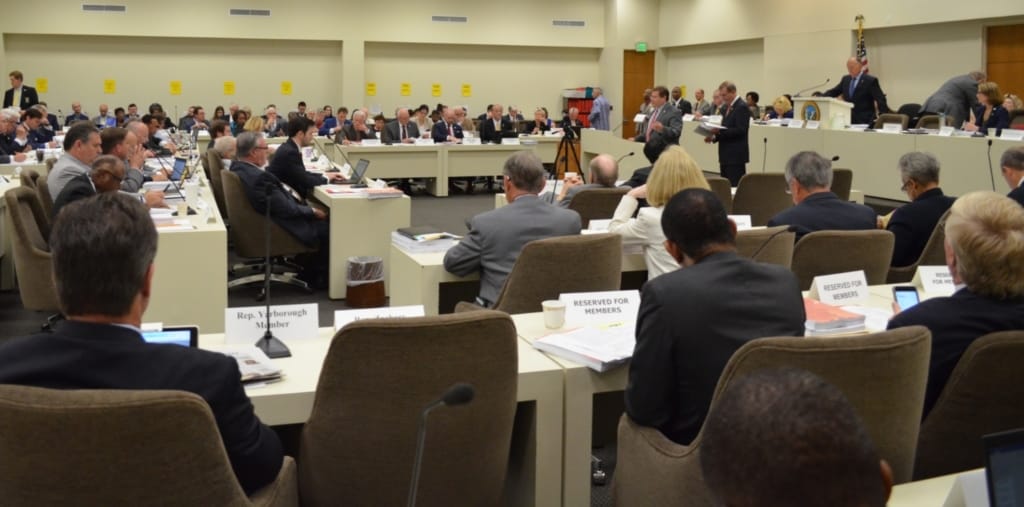
The North Carolina General Assembly released its revised budget for Fiscal Year 2018-2019 Monday night. As of this writing, the budget has passed the Senate and the House and is on its way to the Governor’s desk. The $23.9 billion budget increases spending for 2018-2019 by $885 million more than what was originally budgeted last year.
While some Democrats dislike specific components in the revised budget, they are also decrying the process by which these decisions were made. Republican leaders met before the start of the short session to revise the budget and then released it in a conference report, meaning lawmakers cannot add any amendments to the proposal.
House minority leader Rep. Darren Jackson, D-Wake, stated, “We are in the middle of a budget process not seen in decades. The public had no involvement. Our caucus had no involvement. Many in the other caucus had no involvement.”
While Republican leaders stated this budget is only meant to tweak the two-year budget passed last year, there are some tweaks to education issues. Read the money report and the revised budget.
1. Teachers receive an average 6.5 percent pay raise
The revised budget increases the average pay raise for teachers from 6.2 percent to 6.5 percent and includes veteran teachers with 25 years or more of experience, a group that was left out of the pay raises originally. Because the revised budget includes these raises for veteran teachers, legislators removed the $5 million line item for veteran teacher bonuses.
Governor Cooper’s proposed budget, released in early May, included an average teacher pay raise of 8 percent.
2. Principal pay increased and bonuses tweaked
The revised budget includes $12 million more for principal pay, meaning principals will receive an average pay increase of 6.9 percent. The budget extends the hold harmless clause for one more year, ensuring no principal’s salary will decreases this year as a result of the shift to a new principal pay structure passed last year.
The bonus structure for principals also changed in the revised budget. Principals in the top 50 percent of schools for academic growth will receive a bonus, and those whose schools received a D or F score in the previous year and are in the top 50 percent for growth will get double the bonus compensation.
Cooper’s budget proposed an average 8 percent pay raise for all principals and assistant principals and changed the principal pay structure to be based on years of experience and size of the school.
3. $28 million added for one-year school safety grants
The budget includes $28 million in largely one-year grants for school safety measures: $12 million in school resource officer grants, $10 million in mental health grants for personnel, $5 million for a student threat reporting app, $3 million in school safety equipment grants, $3 million for training school-based mental health professionals, and $2 million in grants to community partners for students in crisis.
Democrats criticized these measures, questioning why funding is given via one-time grants instead of recurring funds. They also argued that Cooper’s budget better addresses school safety needs by providing $130 million in funding and including some gun control measures.
4. Municipal governments allowed to use property taxes to open charter schools
A provision in the revised budget allows municipal governments to use property taxes to pay for public education and ensures taxpayers will not be held liable for school-related debt. The provision was added in response to House Bill 514, which would allow four Charlotte-Mecklenburg towns to start and operate their own charter schools.
A recent report found several fiscal issues with the bill. For example, towns are not able to incur debt and cannot use state funds for capital expenses, so they would have to fund the schools up front without any state help. The provision in the revised budget fixes these issues, allowing the bill to move forward. It is currently working its way through the Senate.
Critics argue it will fundamentally alter the education funding structure and could lead to resegregation of schools as more affluent towns choose to open charters instead of sending their children to the larger school districts.
5. Changes to State Board voting process and DPI funding
The revised budget requires the State Board of Education to take roll call votes moving forward, breaking with their tradition of holding voice votes. Legislators have offered little explanation as to why this provision is included, but it is interesting to note that roll call votes allow legislators to have a public record of how individual Board members vote.
Finally, the budget keeps the $5.1 million in planned budget cuts for the Department of Public Instruction despite requests from State Superintendent Mark Johnson and the State Board to get rid of the cuts. In their letter to the General Assembly, Johnson and the Board argued that the budget cuts would not allow DPI to implement changes based on a recent audit of the department. The revised budget keeps the cuts but allows DPI to offset some of the cuts for one year using $3 million in reversions (unused appropriations).
Read more about the budget:
EducationNC:
- Senate gives budget initial approval
- Democrats decry process as revised budget makes its way through committees
- NC Early Childhood Foundation: A look at the North Carolina General Assembly budget proposal
WRAL
- Legislative budget includes 6.5 percent pay increase for teachers
- 11 other things the new state budget does
News & Observer
NC Policy Watch
Carolina Journal
Weekly Insight Education State Government


